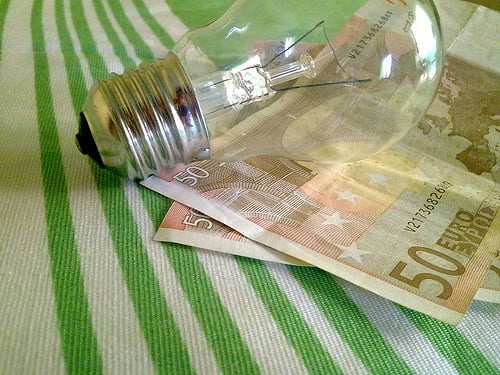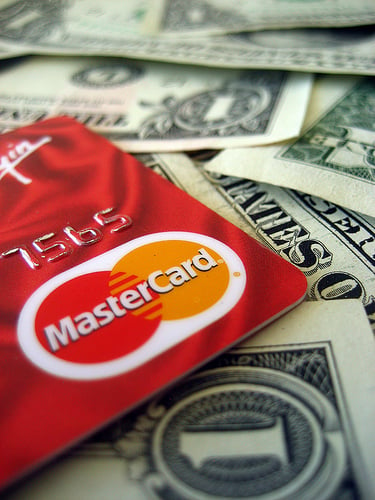How to reduce your living expenses

It sometimes seems that no matter how much money we earn it is never enough. As fast as we find ways to increase our income, fate steps in and our monthly expenses increase, e.g. a rent increase, a baby arrives, the washing machine breaks down etc. The important thing is that we are prepared for these events, and that we find easy ways to save money on a daily basis just in case! There are so many ways to save money and make it stretch, just ask any adult who lived through World War II and they will tell you how ingenious families became when every scrap of food and clothing mattered. Some of those people found it hard to break those habits, and I for one saw (and still see) some evidence of this in my own Mother who was only a child during the second world war. I guess being frugal was a hard habit to break even once rationing was at an end.
Today of course we are not restricted by rationing or a World War that effects our day to day supplies, but there are still many lessons to be learned from the people who did live through World War II, and there are also many ways we can cut our costs and save money by making a few simple changes to the way we do things now. Even if each change we make only saves us a small amount, as the old English expression goes 'You take care of the pence, and the pounds will take care of themselves'. I guess you could adapt this expression by simply changing 'pence' to 'cents' and 'pounds' to 'dollars' and the message would be the same.
I intend this hub to illustrate a number of ways that individuals or families can save money by cutting costs in relatively painless ways. Once these methods become a habit you will barely notice you are using them, but your bank balance or the money left in your purse will show you that they do work and your money can stretch a whole lot further than it has been doing up to now.

Food
Every year thousands of tonnes of perfectly edible foods are thrown away, mostly because we take the 'use by' or 'best before' dates literally. We frequently serve up too much food so there is a large amount of wastage, or the supermarkets throw good food away when it meets its dates. Here are some great ways to save money when it comes to your food bills.
- When it come to use by dates or best before dates use your common sense. If a vegetable still looks fresh and crisp, then it is still okay to eat no matter what the packet says. Even meat (if it has been stored correctly) has some leeway on the dates on the packaging. The dates always err on the side of caution, so most meats will be good for at least a couple of days after the date recommended on the packaging. Products like milk can be smelt to determine if they are still good or not. In other words use your senses of smell, sight, touch and taste to determine the edible quality of food you might otherwise have thrown away.
- Buy foods in the supermarket that have been reduced in price due to short dates. Quite often if you head to the supermarket an hour or two before closing time they will have dramatically have dropped their prices on goods due to go out of date at midnight. We have bought whole joints of meat for 10p before now, and providing you freeze them you can eat them weeks later and they will be perfectly okay. Canned goods last for years, so again buy any of these you see reduced, (just make sure the cans are not dented.)
- Serve smaller portions. The amount of food that is scraped from plates into bins because the eater was full is incredible. As it is we live in an increasingly obese society, so serving smaller portions is healthier all round, as well as being cheaper.
- Use leftovers to make other meals. Instead of throwing away the remainder of your cooked meat and vegetables, try converting them into other dishes, e.g. leftover roast dinner soup or bubble and squeak. Cooked meat can be used for sandwiches the next day, or included in stews, casseroles, shepherd's pies etc. Even if you simply use it to add to meat you have already cooked or browned for recipes it helps to bulk up the volume.
- Buy 'own brands' in the supermarkets as opposed to premium brands. The price differences are very significant, and honestly when it comes to products like canned tomatoes or sweetcorn, you really won't know the difference taste-wise.
- Grow vegetables at home because not only will this save you a lot of money, but you will be eating far fresher and healthier vegetables than those purchased from a supermarket.
- Change your houseplants for vegetables you can grow indoors, e.g. salad leaves, cress, bean sprouts, herbs etc.
- Keep a few chickens for eggs.You can guarantee the eggs will be fresher than any you can buy in the shops, and you can also boil up all your vegetable peelings to feed to them, as well as any stale bread, cabbage stalks etc. They will need some proper mixed corn on top of this of course, but the eggs should still work out cheaper than in the shops.
- Make your own packed lunches, both for your children to take to school and for yourselves. The amount we spend annually on ready packaged sandwiches and fast food from shops is incredible, and there are big savings to be made by making your own at home instead.

Clothes
Clothing is a significant expense for all of us, and no-one wants to be seen wearing the same clothes year after year. Children grow out of clothes and they need replacing, plus of course clothes do wear out. Here are a few ideas to save money on your clothing.
- Visit charity shops. There are frequently some amazing bargains to be had in charity shops, and often the clothes still have the tags in because the person who donated them never got around to wearing them, or found out the clothes didn't fit when they did. Even those without tags have often only been worn once or twice, and an outfit that might have cost a couple of hundred pounds or dollars, is suddenly available to you for only a few pounds or dollars.
- Speak to your child's school about setting up a school uniform recycling scheme. These allow parents to donate the uniforms their children have outgrown to the scheme, and parents who are struggling to afford to buy uniforms can have them instead. Remember when your child leaves school to donate any uniforms back to the scheme in order to help out another family.
- 'Hand Me Downs' are another good way to stretch the life of your children's clothes. If you have more than one child of the same sex you can often pass outgrown clothes on to the next child. Children grow so fast that there is often plenty of wear left in the clothes, and this is a great way to ensure you get value for money out of them. Alternatively you can swap these outgrown clothes with other parents you are friends with that have children of a similar age.
- Get shoes re-heeled rather than buying a new pair.

Electricity Bills
There are many ways to reduce your electricity bills, but here I will include some of the basic ones that are going to make a noticeable difference when you receive your quarterly statement.
- Change as many light bulbs as you can for energy efficient ones. Although these seem quite expensive they quickly pay for themselves from the savings you make.
- Turn your heating down by 1 degree Celsius. Over a year this makes a big saving.
- As above but turn the thermostat on your hot water tank down by 1 degree Celsius.
- If you have a cheaper electric tariff during certain hours, make sure you use those hours to run washing machines, dishwashers, immersion heaters etc.
- Use the microwave whenever possible as this is far cheaper than using ovens, stoves and kettles.
- Share baths as this conserves hot water. If the bath is too small for two at once, use it one after the other.
- Shower rather than having a bath for the same reason as above.
- Turn off your heating and visit friend's houses instead.
- Turn out lights in rooms or corridors that are not in use.
- Turn off your televisions at the wall when they are not being watched, as even on standby a television uses almost as much electricity as when the picture is on.
- Only put as much water in the kettle as you actually need rather than filling it up completely.

Social Life
We all enjoy a night out, but is there a way we can still have a social life without it becoming an unaffordable luxury?
- Reduce the amount of nights you go out. You don't have to stop going out altogether, just keep it to sensible levels.
- Buy beer or wine from the supermarket instead of in the bar or pub. You can always invite a few friends over and ask them to bring their own alcohol.
- If you are in the bar or pub with friends don't get into the 'round buying' trap. Far better to say you prefer to buy your own because you are trying to save. Most friends will understand this and it doesn't mean you can't still socialize with them.

Home and Garden
There are lots of ways to save money at home, and not always the ones you might immediately think of.
- Put a brick in your toilet cistern to save money on your water bill.
- As I said earlier, but for different reasons, have a shower rather than a bath as this too will save money on your water bill.
- Set up a water butt/barrel in your garden and collect rainwater for your garden. Again this will keep your water bills down.
- Charge your adult children still living at home a sensible rent/keep, and make sure you are not guilty of subsidizing them.
- Rent out a spare room to a lodger. Alternatively take in foreign exchange students because the companies that organize their trips usually pay quite well, and you only need to have the students for a week or two at a time.
- Share your WiFi with a nearby neighbor and split the cost.
- Use free WiFi available in public places rather than having it at home.
- Use Skype instead of your telephone to make phone calls.
- Make your children pay for their mobile phone bills out of their pocket money/allowance rather than you paying their bills.
- If you have any spare land rent some out for grazing or for allotments.
- Consider downsizing to a smaller more affordable property.
- Buy one of those gadgets that allows you to mix your old newspapers with water and then compress them into blocks you can burn instead of logs.
- Save bottles that offer money back as this can quickly add up to a nice amount of money, as well as being environmentally friendly.
- Start cutting out coupons from newspapers and magazines and use them to make savings in the supermarkets.

Transport
The cost of getting from A to B can be cut considerably by making a few easy changes to either your car or your means of traveling.
- Walk to work, the shops or school instead of using the car.
- Cycle to work, the shops or school instead of using the car.
- Car share with work colleagues so you take it in turns to drive each other to work. The same can be done with other parents and school runs.
- Use public transport instead of your own car.
- Get a smaller lower performance car that won't be such a gas guzzler.
- Always run your car from nearly full rather than nearly empty, because you lose less fuel to evaporation within the fuel tank if there is no air space for it to evaporate into.
- Don't fill the trunk/boot of the car with unnecessary junk that you end up carrying around with you. This only increases fuel consumption and serves no useful purpose.
- Don't leave roof boxes on your car unless you need them because they increase wind resistance, and therefore your fuel consumption.
- Check your tire/tyre pressures weekly, as if the pressure drops too low your fuel consumption goes up.
- Avoid using air conditioning in your vehicle because it immediately increases your fuel consumption.
- Drive slower.

Miscellaneous
Some of the best ways to save money don't really fall clearly into any of the above categories so I have amalgamated them here instead.
- Use banana skins instead of shoe polish as they contain a natural oil that will really make your shoes shine.
- Cut up your store cards and credit cards because they are just a temptation to live beyond your means, and you end up paying even more for goods and services because of the interest these cards charge if you don't pay them off completely at the end of the month.
- Buy clippers and cut your own hair (men mainly) rather than paying a barber or hairdresser to clip it for you.
- Look for own brand products or special offers on household essentials when you are shopping. Lots of items like shampoos, toilet rolls, kitchen rolls, bleach, washing up liquid etc can be purchased more cheaply if they are the supermarket's own brand, and often they are on great deals like 'buy one, get one free' etc.
- Smoking. If you can I strongly suggest quitting smoking as a major way to save money (I did and saved a fortune), but if you really can't stop right now, then at least stop buying ready rolled cigarettes and buy loose tobacco and papers instead. Roll ups are much cheaper to smoke than ready rolled cigarettes.
- Have a garage sale and clear out any items you no longer want, need or use. This can produce a very handy lump sum.
- Agree with your spouse or adult relatives not to buy gifts for each other on certain occasions/holidays, e.g. Valentines Days, Birthdays, Easters, Christmases etc. If this seems too drastic why not do something together that you all chip in for instead, e.g. a meal out?
- If you have debts then consider getting help from a debt advisory service. Quite often they can negotiate with your creditors on your behalf and get substantial sums slashed from your debts and interest charges waived. You may even be able to get this service free if you contact your local citizen's advice bureau.
More Money Related Hubs by Mistyhorizon2003
- Can money buy you happiness or not?
Have you ever wondered if money could buy you happiness? The old saying has always been 'money can't buy you happiness', but I would like to argue that in many ways it can buy you happiness, although maybe not in the ways you might imagine. - How can I make money from writing online?
Are you wondering if you really can make money from writing online, or possibly even earn a full time income? Well the answer is yes you can, but this is no get rich quick scheme and it will require hard work.... - How to Reduce Your Electricity Bills
Are you frustrated and fed up of huge electricity bills? Well if so this article will tell you how to easily reduce your electricity bills by a considerable amount.....











